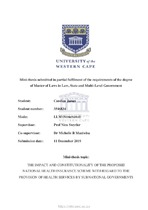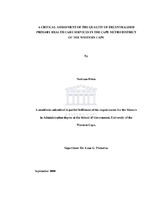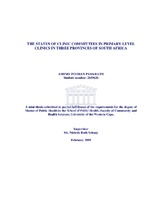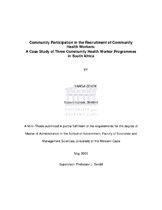| dc.contributor.advisor | Steytler, Nico | |
| dc.contributor.author | James, Candice | |
| dc.date.accessioned | 2020-10-06T13:12:23Z | |
| dc.date.available | 2020-10-06T13:12:23Z | |
| dc.date.issued | 2020 | |
| dc.identifier.uri | http://hdl.handle.net/11394/7345 | |
| dc.description | Magister Legum - LLM | en_US |
| dc.description.abstract | In South Africa, there are two health systems through which health services are delivered,1 namely private and public. These two systems were inherited from the apartheid regime.2 With South Africa’s political change from a system of parliamentary sovereignty to a constitutionally supreme system in 1996, huge changes were bound to come including changes to the health sector.3 This meant the overhauling of health legislation, as the right of access to health care services became guaranteed in the Constitution of the Republic of South Africa, 1996.4 In 1997, the White Paper on the Transformation of the Health System (White Paper on Health)5 was introduced with the aim of developing a national health system.6 There has been a lot of progress made in reforming the health sector, however there are still many cracks that the national government aims to remedy through the realisation of universal health coverage (UHC). | en_US |
| dc.publisher | University of Western Cape | en_US |
| dc.subject | Municipal health services | en_US |
| dc.subject | National Health Insurance (NHI) | en_US |
| dc.subject | Primary health care | en_US |
| dc.subject | Universal health coverage | en_US |
| dc.title | The impact and constitutionality of the proposed National Health Insurance scheme with regard to the provision of health services by subnational governments | en_US |
| dc.rights.holder | University of Western Cape | en_US |




